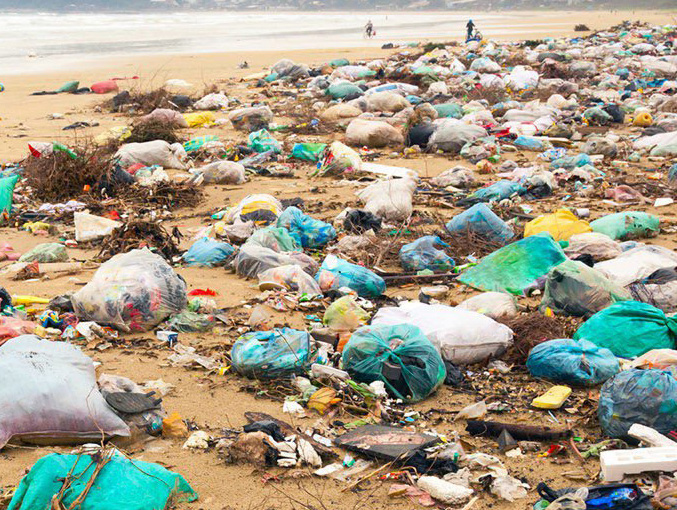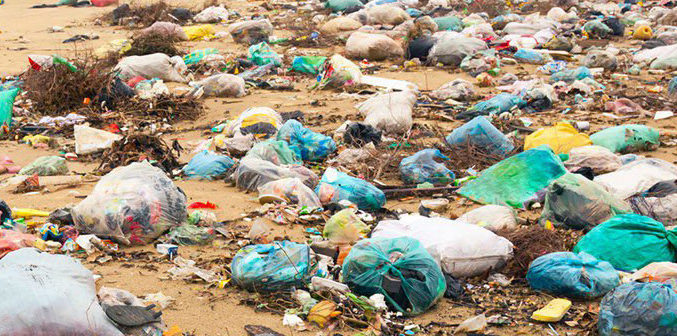
Credit:@momentum_unfccc
By:Victoria Cavillo
Even though many countries are taking action to help reduce plastic pollution, Costa Rica is taking the biggest step any country has yet to enforce. Costa Rica plans to become the first country in the world to ban single-use plastic, expecting the full transition to take action in 2021. Single use plastic is a big factor in the world’s pollution issue, causing companies, such as the Natural Resources Defense Council (NRCD), to suggest people call out companies about their single use plastic habits. Single-use plastic products are made from plastic that is usually disposable after one use. Examples of the plastic items being banned are plastic cups and plastic cutlery. The banned products are going to be replaced by biodegradable alternatives. Serious repercussions come from throwing away plastic items, especially if they are not disposed of properly. Dr. Chris Miller, associate professor of Biology, said the biggest repercussion is not a natural product, and plastic is everywhere, including in his office.
“It’s only going to degrade to a certain extent,” said Miller. “We made this stuff without really thinking about it, and it’s ambiguous now.” Pollution is a rising issue around the world, with the biggest factor being plastic waste.
This not only affects humans but also animals. According to the NRCD, there is a large amount of plastic garbage in every ocean on Earth, and this poses a threat to marine life. Miller agrees.
“The biggest concern is that the plastic will get into aquatic ecosystems, and when it gets into aquatic systems it breaks down into smaller pieces and then can be ingested by all sorts of organisms – by fish, shrimp, everything,” said Miller. “Whenthey ingest, it is a real concern because other organisms eat fish, including humans, so it kind of comes full circle.”
According to Ocean Crusaders, plastic bags are the most seen item by boaters. These large amounts of plastic bags polluting the oceans are causing threats to the marine life inhabiting the aquatic environment.
“I don’t think we have been very judicious with it [plastic]; it’s a very big product that we really need to be careful with, because we constantly use it. It would be nearly impossible to completely remove it from society altogether. I think, though, we need to keep a careful watch on what happened because of it,” said Miller.
Costa Rica is currently facing major problems with trash pollution in their nearby water sources; however, with the country’s plans to ban single-use plastic, pollution will decrease and Costa Rica will be notably more eco-friendly.
“This is a good idea because Costa Rica has positioned themselves as an eco-friendly tourism place, which is one of their biggest profits over there. So, in doing this it demonstrates an ethic they want to propagate,” stated Miller.
In fact, switching to biodegradable items is not Costa Rica’s first initiative to living a greener lifestyle, as they are almost completely powered by renewable energy.
Yale Environment 360 states, “The country, famous for its ecotourism industry, produces almost all of its electricity from renewable sources, with 80 percent coming from hydroelectric power.”
Other countries that are also on their way to becoming more eco-friendly nations are Sweden, Scotland, Germany, and the United States, according to The Climate Reality Project. In 2015, Sweden announced the country was eliminating fossil fuel usage, and switching completely to renewable
energy sources. They immediately invested in solar and wind energy. Along with this major switch, they also includedmoving toward clean transportation. The Climate Reality Project also mentioned that 2015 also marked the year that Scotland was conducting the equivalent amount of wind power it would take to run 97 percent of their nation’s household electrical needs. Germany is also taking thelead, with being able to power up to 78 percent of their nation’s power usage needs in a day. Also, the United States has the second highest, behind China, of wind used energy. Also, there are countries implementing single use plastic initiatives. Some countries are doing this by putting an extra tax on purchases if one chooses to use a plastic bag, instead of paper. According to BigFatBags, Denmark began taxing retailers extra if they used plastic bags, instead of brown or reusable. This has caused stores to use reusable bags, as they do not want to be charged extra fees for using plastic. Also, some places around the world are stationing recycling bins inmore areas, and selling reusable cloth grocery bags and/or paper bags.
“It [single use plastic initiatives]is a good idea because we need to start moving toward a better ecosystem, and the cost of dealing with plastic is a waste. Doing something about it will outweigh the benefits it provides society,” said Miller.
All in all, there are many initiatives currently happening in the world to help single-use plastic issues, and hopefully this
can result in lower rates of pollution.





